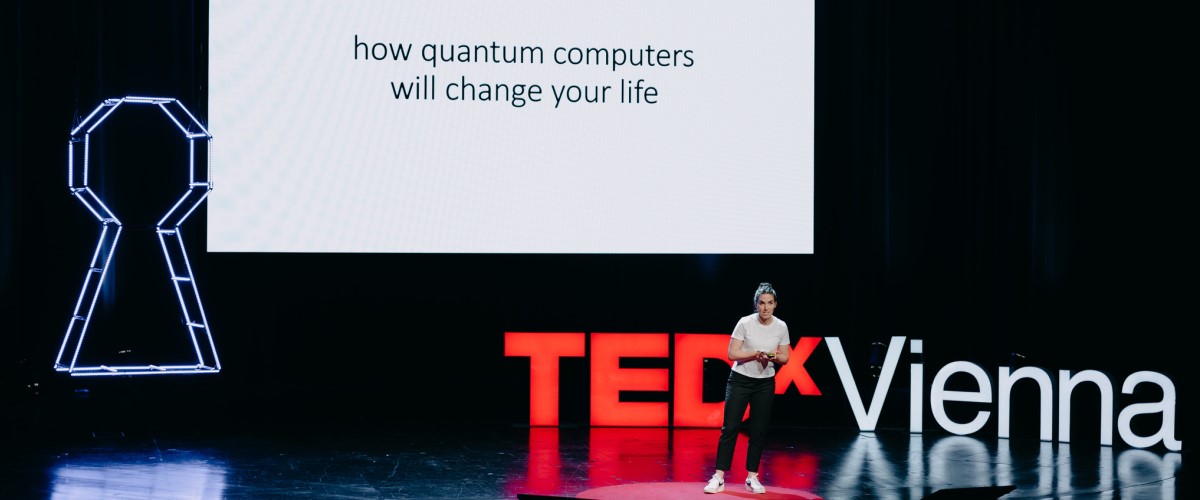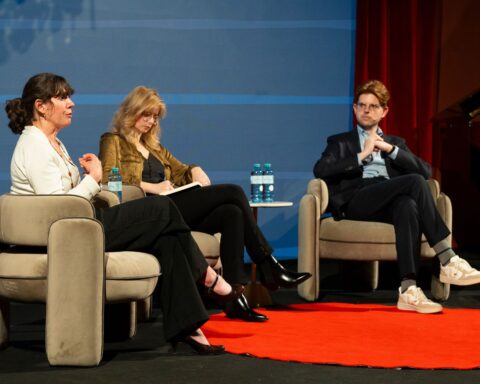When you hear “quantum computers” – how do you feel? Curious? Intimidated? Excited? Disconnected? Respectful? Confident? Maybe a mix of these emotions? For me, it is definitely curiosity because of its potential mixed with the fear of not being able to understand it and therefore also a bit disconnected to the topic.
A person who tries to make us all feel less disconnected and more comfortable with the topic of quantum physics and in particular quantum computers is researcher Irati Alonso Calafell. Throughout her PhD, she has been working on building quantum computers using photons as part of a research team at the University of Vienna.
In the future, there will be a lot of fields where quantum computers will potentially lead to disruptive innovation and new solutions. Examples are artificial intelligence, logistics and pharmaceuticals. Quantum computers are significantly faster than classical computers, and they are very strong in combinatorics, which makes them particularly interesting for these and similar areas of application.
In our interview we discussed the beauty but also the risks of quantum computers, advice for future generations of researchers and what it takes for a country to be ahead in the race for quantum computers.
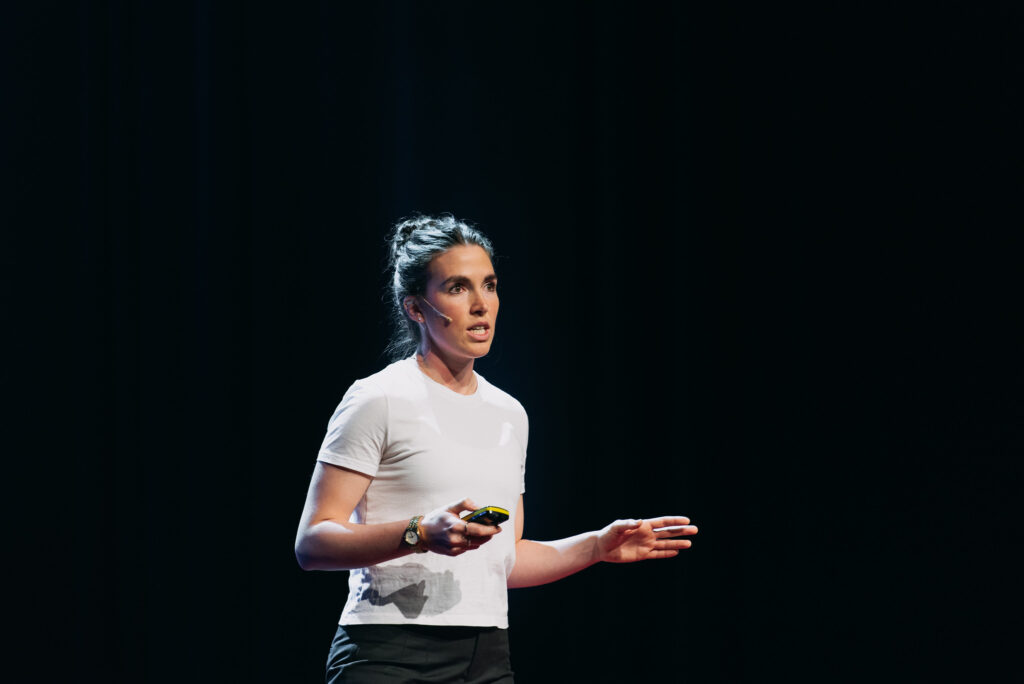
How did you get interested in quantum computers and start researching it?
Everything was a little bit coincidental. I did my bachelors in Spain and finished my bachelors in Helsinki, where I was doing Erasmus. Then I started my masters in Berlin. The thing is – I was always very curious about quantum mechanics – but in Berlin, they are very strong in theory and I have always been a practical person. Somehow Vienna, apart from the fact that my boyfriend was from here, felt like a natural place to come. They [the University of Vienna] are very strong in experimental quantum physics. And that’s kind of how I ended up doing it.
Doing research is a bit like a “finding nurture” thing. You go to university, you are basically a kiddo, you don’t know what you are doing, and eventually you just keep going. You finish the bachelors and you kind of enjoyed it and I guess the natural thing is “Ok I’ll just do the masters”. I was already doing my master thesis in the same topic and then I was like, “Ok I guess I can continue doing this” and yeah I liked it. That’s how I ended up [researching quantum computers].
To you personally, what is the beauty in it – what really inspires you?
Maybe the abstractness of it. Because nobody can really show it to you, right? You cannot really draw entanglement or so, but it’s kind of fun to imagine it in your head. I think that’s one of its beauties. And on paper it’s actually very simple – with a bit of mathematics. It’s really nothing very complicated, yet the concept behind it is fascinating.
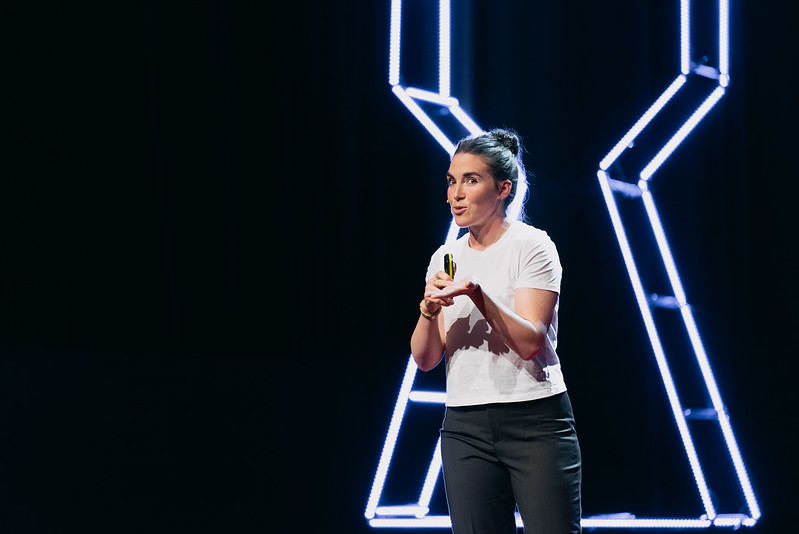
If a young person gets inspired by your talk – since this was also one of your goals with the TEDx talk – and wants to start researching in this field or even wants to start a career in quantum physics, what advice would you give them?
I would say in general, regardless of the topic, after many years in research: patience. And also to take it a bit like “this is your job” and you know, sometimes things go right and sometimes things go wrong. But I guess resilience is one of the things that make researchers so good. In the beginning you feel like you are not getting anywhere, but at some point everyone gets somewhere, right? So even if it is showing that something doesn’t work, it’s already work that has been done. So I think this should also be praised.
The research on quantum computers is currently still at the state of fundamental research. Nonetheless, do you already have a guess where and with what we will get in touch with first in our daily lives?
The impact that it’s going to have in our daily lives? Two main things that come into my mind: one may definitely be the drug industry when we talk about pharmaceuticals. It is also a little evil. But of course we all take them, and we all take advantage of them. So when you think about medicine and biological engineering, you are also talking about genetic modification and things like that. And you know there is a lot of debate if we should enter there or not – but it’s good to know that there is potential – you could afterwards use it or not. But I think it’s something.
And then in general security– like banks and everything that is encrypted. We may not feel it so much in our daily lives, but there is a lot of secrecy and a lot of keys. Because quantum computers are very good at solving the security of classical computers. So definitely there will be a huge impact on that – even if we don’t feel it so closely.
Are there risks, and can you give us some examples?
I cannot really point out a risk. But it’s just the risk that comes with everything that is new. If there is an outbreak, something that is completely new – there is always something bad, and very often we don’t even see it. Of course, if you start thinking about genetic modification or start talking about artificial intelligence: How far should we take it? There are a lot of ethics and morals that will have to be considered there. Again, I cannot point out what the risks are. But it’s definitely something very new that could have a huge impact on our lives. There could be risks, and I am pretty sure there will be risks, but hopefully the reward is compensating for the risk.
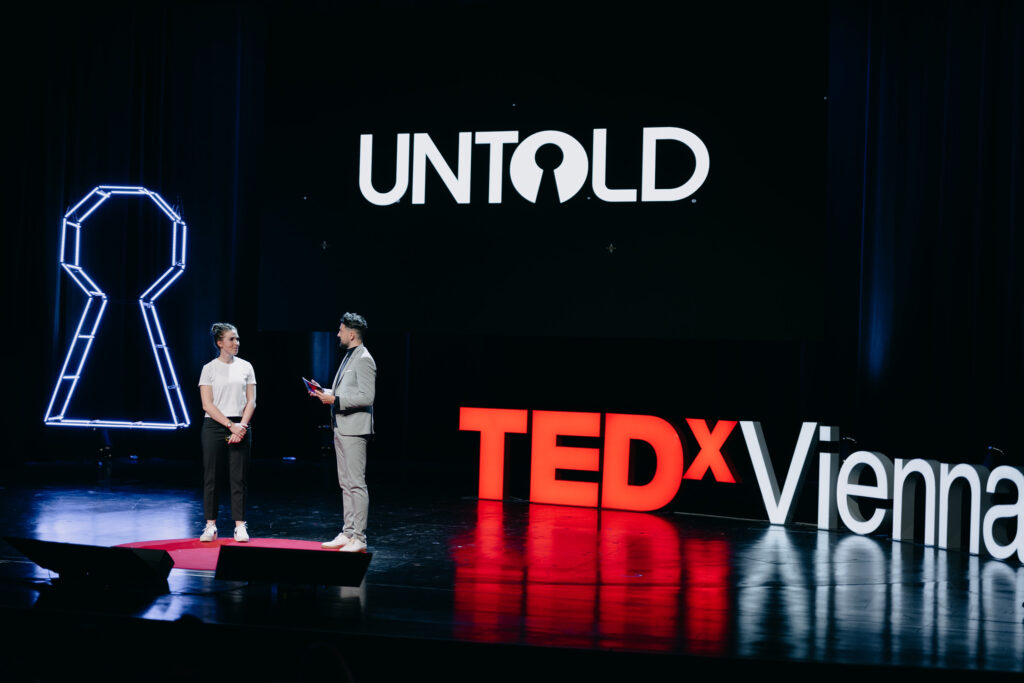
Another question about the research. Which conditions would be needed at universities in Europe to be ahead in the race for quantum computers, and if you could wish for one thing – what would it be?
I think it all comes down to money at the end of the day. So research, at least in research institutions, is funded by the public’s money most of the time. Very often, as I mentioned [in the talk], it is a technological problem and technology is expensive. Sometimes I feel like we have to spend a lot of resources in writing applications and in writing proposals. Which I understand, because it is very valuable money, and you want to make sure you invest it in the right fields. But a big chunk of being a researcher is getting the money. So if that part would be easier…
Which I understand is a real challenge, because you spread the money among the different fields and different things for your country. But still this is basically the main challenge I would say, because I think there are a lot of capable people who are doing the research but at the end of the day, at least in experimental physics, it comes down to money and getting the resources. I think that’s one of the reasons that China, for instance, is really leading at the moment. They put a lot of money in it, and they have the resources, the human power and the will to do it.
It is very bold but in a laboratory there are so many millions of Euros put in different machines, and it is all about money, and you can really feel it. In countries where money is lower for research, they tend to do a lot more theory than experiments, since all you need for theory is a super computer. Then you also need some desks and computers.
But when it comes to experimental physics, a laboratory – it’s like jewelry.
And what’s for you personally? What is the next interesting thing to research?
My project is still open. We made very good progress but we haven’t achieved the ultimate goal, which is getting single photons on demand. Basically there is no machine in the world where you press the button and you get one photon. And that’s pretty much what we would like to do. I think we have the ideas in which direction we should go in order to achieve it one day. My colleagues are continuing this work, so I would be very much interested in seeing this flourish.
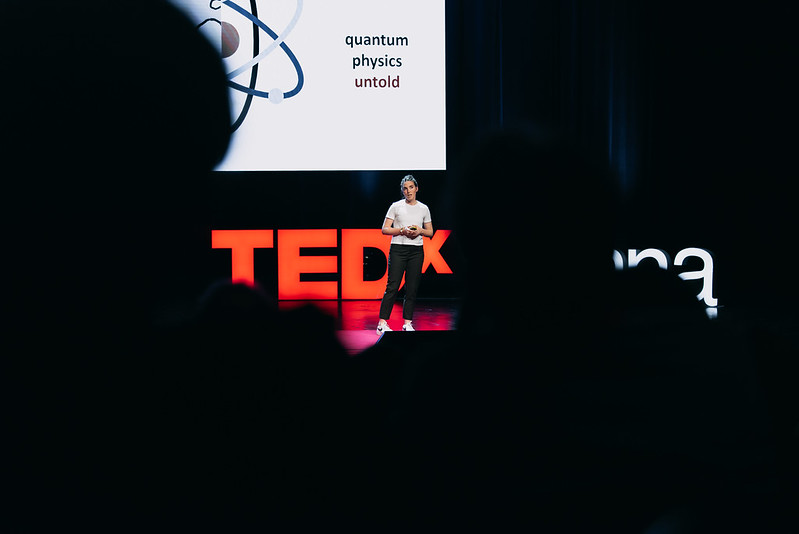
During your talk you pointed out that there are different systems (e.g. photons, atoms, superconducting circuits) where to code the information to build a quantum computer. Why did you choose photons?
I think one of the amazing things about photons is that they can travel very far. That is seriously something very interesting, especially for quantum communication. Every time we look at the stars we get photons from very far away and these little guys are just fascinating. I guess it just happened because I found this group that was amazing to work with and they focused on photons. The more I learned about them, the more I was fascinated by them, but I am sure the others have their own remarkable features.
Is there something else you couldn’t talk about in your TEDx talk because of a lack of time?
I think I came across with all the points. It wasn’t so much about what you have learned, but about not having the fear of really knowing what quantum is and just giving it a chance every time you read it in the newspaper. Maybe also about having the critical mind – when someone says “quantum supremacy”. We were hearing it, especially the first time, with Google: “wow, amazing quantum supremacy”. And you don’t even know what quantum supremacy is. It certainly sounds very fancy.
Just to think about it, like “Wait a second, what does this mean now?” or “What is the application of it?”.
If you are curious what tossing a coin has to do with understanding the basis of quantum computers and what the current state of research is, watch Irati’s enlightening TEDx talk about a complex topic: Quantum – the power of the little things.
Header image by Florentina Olareanu at Golden Hour Pictures

